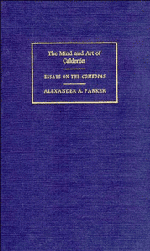Book contents
- Frontmatter
- Contents
- Author's preface
- Editor's preface
- Introduction
- I Stylistic and dramatic craftsmanship
- 1 Principles of interpretation
- 2 From metaphor to symbol
- 3 The dramatic structure of El alcalde de Zalamea
- 4 ‘Poetic truth’ in the shaping of plots
- 5 The Coriolanus theme: Las armas de la hermosura
- II From experience to myth
- III The tensions of social life
- IV The tensions of public life
- V From symbol to myth
- Epilogue
- Notes
- Index
4 - ‘Poetic truth’ in the shaping of plots
Published online by Cambridge University Press: 05 February 2012
- Frontmatter
- Contents
- Author's preface
- Editor's preface
- Introduction
- I Stylistic and dramatic craftsmanship
- 1 Principles of interpretation
- 2 From metaphor to symbol
- 3 The dramatic structure of El alcalde de Zalamea
- 4 ‘Poetic truth’ in the shaping of plots
- 5 The Coriolanus theme: Las armas de la hermosura
- II From experience to myth
- III The tensions of social life
- IV The tensions of public life
- V From symbol to myth
- Epilogue
- Notes
- Index
Summary
The preceding chapters have demonstrated how ‘reality’ is moulded to fit the poetic and dramatic ends that Calderón had in mind. ‘Reality’ is moulded through metaphors into symbols, and a ‘real-life’ plot is given a structure that has a unity imposed by a logical plan. The action of El alcalde de Zalamea, however, does not distort or pervert ‘reality’; on the contrary, it serves to highlight it. Frequently, however, Calderón takes vast liberties with plots that come straight from historical sources, or from well-known literary sources, such as mythological fables. This freedom aroused the scorn of neo-classicists and of all later critics who considered, naturally enough, that historical plays should be true in essentials to the events they were re-imagining. Marcelino Menéndez Pelayo, in his centenary study of Calderón in 1881, could not impute ignorance of history to the dramatist, and had to fall back on the charge that his failure to be ‘historical’ was due to negligence or total disregard of the nature of historical drama. This charge was, on the face of it, unlikely to be true, and in fact when he made it he was himself guilty of disregard of the fact that the literary theorists of the Golden Age expressly repudiated fidelity to historical sources as a strict requirement in drama; either because he thought that Calderón went much further than they would have been allowed, or because he could not condone any departure from truth even on the part of reputable Renaissance theorists.
- Type
- Chapter
- Information
- The Mind and Art of CalderónEssays on the Comedias, pp. 51 - 56Publisher: Cambridge University PressPrint publication year: 1989



